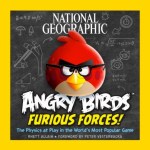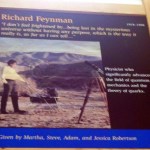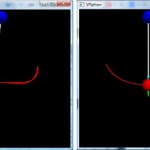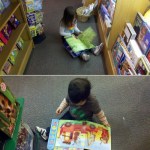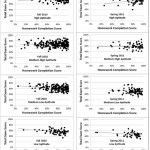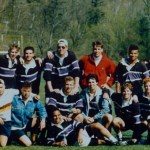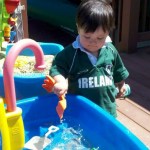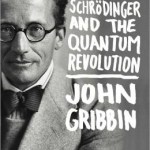
I've just emerged from a week in the Incredible College Simulator(*), first spending a week at DAMOP and then the weekend at my 20th college reunion at Williams, so while I have physics stuff I ought to write about, my brain has temporarily turned to goo. Also, I have a week's worth of administrative crap to do that I refused to deal with while I was away. So instead of deep commentary about science, here's some silly pop culture material, from a giant mailing-list thread that also exploded last week. (Hey to occasional commenter Dr. Pain...)
The idea of the game is to stick together two song…
A little while back, I posted about the pro-theorist bias in popular physics, and Ashutosh Jogalekar offers a long and detailed response, which of course was posted on a day when I spent six hours driving to Quebec City for a conference. Sigh.
Happily, ZapperZ and Tom at Swans On Tea offer more or less the response I would've if I'd had time and Internet connectivity. Tom in particular gives a very thorough exploration of some of the reasons why experiment gets downplayed in popular physics. I particularly liked this bit:
I’m going to put forth a possibility: maybe we have a harder job, in…
Rhett at Dot Physics departed ScienceBlogs before NAtional Geographic fully took over, but still managed to connect with their book division for a physics text. This is part of a series they're doing tied in with the folks from Rovio, makers of the world's most popular smart-phone time-waster, and, as the title suggests, it uses Angry Birds as a jumping-off point to talk about physics. Rhett was, of course, an obvious choice for this, given the amount of time he's spent doing video analysis of Angry Birds to extract the underlying physics.
This is a book that can't really be reviewed just as…
For the last several months, I've been poking along on the book-in-progress in a very constrained manner-- basically, I get to work on it in three-hour chunks on Tuesdays when I don't have class (and this term, Thursdays as well). This is, as you might imagine, incredibly frustrating, though I do get some book-related stuff done in the evenings, mostly reading history of science books and the occasional textbook after the kids go to bed.
Other stuff ate up a lot of this week's meager writing time, and next week's going to be a dead loss, as I'll be at DAMOP in Quebec City, then my 20th…
I mentioned on Twitter that I was thinking of proposing a Science Online program item about the professionalization of blogging, throwing in a link to post from a couple months ago. That included a link to this SlideShare:
Talking to My Dog About Science: Why Public Communication of Science Matters and How Social Media Can Help from Chad Orzel
And that was re-tweeted by Chris Chabris, kicking off a gigantic conversation about the whole idea of scientists communicating directly with the public (most of which took place after I went to bed last night, so I only saw it in my Twitter…
While we're revisiting blog topics of the recent past, another item from this weekend's visit to the Ithaca Sciencenter, in the form of the picture above. For those with images off, or who read via RSS and won't see the picture, it's a photo of one of the inspirational plaques they have lining the walls of their community room, honoring famous scientists. This particular one is for Richard Feynman, and what struck me about it was that the photo isn't his Nobel Prize portrait, or him playing the bongos, but a somewhat grainy picture of him standing next to a telescope in the desert, pushing a…
Last week's post about communications between scientists and journalists sparked a bit of discussion, and prompted the folks at the IoP's Physics Focus blog to ask me for a guest post advising journalists on how to talk to scientists. The post is now live, with the self-explanatory headline How Journalists Can Help the Scientists They Interview:
The temptation for each party in this situation is to try to push as much of the work to the other as possible, and that’s where most advice from journalists to scientists (or vice versa) fails. Each side treats the conventions of their particular…
Kate's off at Wiscon this weekend, so I came down to my parents' with the kids, rather than be outnumbered at home. We packed everybody into the car Saturday and drove to Ithaca to go to the Sciencenter, which the kids absolutely loved. In the "featured image" above, you see The Pip playing with the giant bubble maker (which we did for about fifteen minutes...), and SteelyKid emulating a recent Mythbusters by building a wooden house on a shake table to simulate an earthquake (with my grandmother). Other highlights included petting a snake, feeding balls through pneumatic tubes, and building…
Last week, I spent a bunch of time using VPython to simulate a simple pendulum, which was a fun way to fritter away several hours (yes, I'm a great big nerd), and led to some fun physics. I had a little more time to kill, so I did one of the things I mentioned as a possible follow-on, which turned out to be kind of baffling, in a good way.
Last week's post was written very quickly, and thus ended up a little more jargon-y than I usually shoot for, so let me try to set the stage a little better for this one. the physical system I'm talking about is just a simple pendulum, a mass on the end of…
Over at National Geographic's other blog network, Ed Yong offers a guide for scientists talking to journalists. Like everything Ed writes about scientists and journalists, this was immediately re-tweeted by 5000 people calling it a must-read. Also like nearly everything Ed writes about scientists and journalists, some of it kind of rubbed me the wrong way.
Given our respective areas of interest, there's approximately zero chance that Ed will ever contact me to ask my opinion of a paper, but I want to push back on a few of these, anyway. Because, in the end, scientists aren't responding in…
At Scientific American's blog network, Ashutosh Jogalekar muses about the "greatest American physicist", eventually voting for Josiah Willard Gibbs, one of the pioneers of statistical mechanics. As both times I took StatMech (as an undergrad and in grad school), it was at 8:30 in the morning, I retain almost no memory of the subject, and will bow to greater experience in assessing Gibbs's importance.
I do, however, want to take issue with one thing in the post. When assessing the historical place of American physics, he writes:
Here’s my personal list for the title of greatest American…
During our weekly trip to the Schenectady Greenmarket, we took refuge from the rain in the Open door bookstore, where a short while later I saw the following scenes at opposite ends of the kids-book aisle (also the "Featured Image" for this post, but I'll reproduce it to save the RSS folks from having to click through):
SteelyKid and The Pip, both reading.
So, clearly, they take after me and Kate...
(We ended up buying the "How to Make Paper Airplanes" book SteelyKid is looking at, because paper airplanes are awesome. The music-playing book about an orchestra that The Pip is looking at…
There's a famous story about Richard Feynman at Cornell suffering from the science equivalent of writer's block, after WWII. He was depressed and feeling like everything he did was pointless, until one day he spotted a student throwing a plate up in the air in the cafeteria. As the plate spun, it wobbled, and the wobble seemed to go faster than the spin. Intrigued, he sat down and calculated the physics involved, finding that, indeed, the wobble should go at twice the rate of spin. This basically reignited his interest in physics, and shortly after that, began his legendarily productive…
One of the perennial problems of teaching intro physics is getting students to do their homework, so I was very interested to see Andy Rundquist on Twitter post a link to a paper on the arxiv titled "How different incentives affect homework completion in introductory physics courses." When I shared this with the rest of my department, though, I got a link to an even more interesting paper from the same group, on the effect that doing homework has on student performance. This has an extremely surprising conclusion: for the weakest students in introductory physics, doing more homework actually…
SteelyKid has a new prize possession: a training-wheel bike!
You can't quite hear what she says at the end of this, when she stops the bike, but it's "That should be a full video!" She knows her fan base.
On the way back, she wiped out (the first bad crash on the new bike) and has been much more cautious since. But she's practicing a lot (around the neighborhood, in the Field House, around the neighborhood again...), and will hopefully gain confidence.
Here's hoping your weekend brought you something a tenth as much fun...
The book-in-progress (which is coming along, albeit slowly, thanks for asking) is built around making analogies between scientific discoveries and ordinary activities. This necessarily means telling a lot of historical stories, which is both good and bad. The bad part is that actual history is way messier than the streamlined version you get to use if you're primarily trying to explain the science, and I feel some obligation to do this right as much as possible, thus making work for myself. The good part is I'm reading a lot of narrative history of science stuff, which is kind of fun. In…
My 20-year college reunion is coming up at the start of next month (at the end of the week of DAMOP in Quebec-- I'm going to be completely wiped out...), so I've been thinking a bit about nostalgia. A little while back, the subject of reunions came up on an email list, and somebody trotted out the classic "Those are the best four years of your life" line. This produced a definite split, with some people scoffing at the idea that college or high school could legitimately be considered the "best," while a couple argued that it's not necessarily ridiculous on the face of it: after all, you're…
An astute observation from SteelyKid, as part of her jumping game:
With bonus photobombing by The Pip toward the end.
My parents have a DVD of the Bacon Brothers singing "The Wheels on the Bus" over an animated scene, which The Pip loves and insists on watching over, and over, and over, and over... As the parent sitting through this on Sunday morning, I got a little punchy over on Twitter, and invented some quantum-physics-themed verses (if you don't know the tune, 1) count yourself lucky, and 2) here's a clip from the video on YouTube). Here are the results:
The electrons on the bus are fermions,
fermions,
fermions.
The electrons on the bus are fermions, in antisymmetric states...
Operators on the bus are…
Erwin Schrödinger is one of the more colorful figures in physics history. He's best known for Emmy's favorite thought experiment, of course, which attempts to demonstrate the absurdity of quantum physics through locking a cat in a box. This overshadows the Schrödinger Equation, the central equation of non-relativistic quantum mechanics, which won him a Nobel Prize in 1933. He's also renowned within physics for his unorthodox personal life, which involved innumerable extramarital affairs, and ultimately cost him a job at Oxford.
The definitive academic biography of Schrödinger has been out for…
